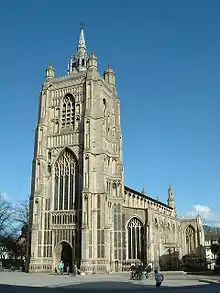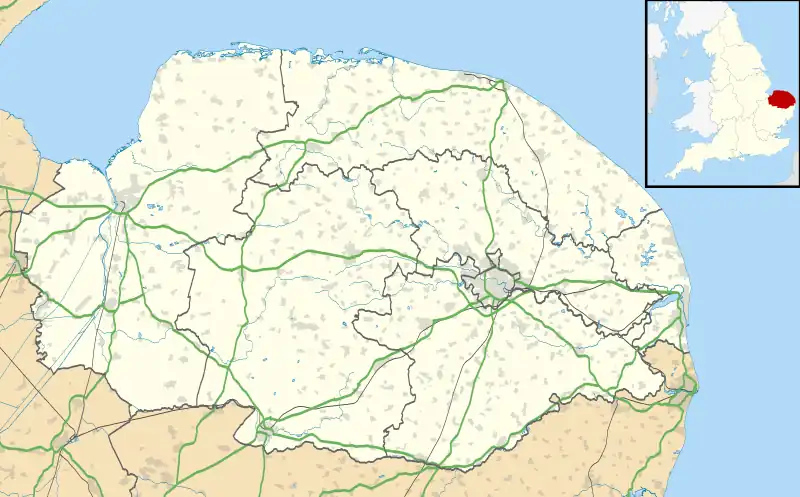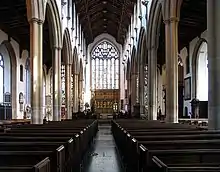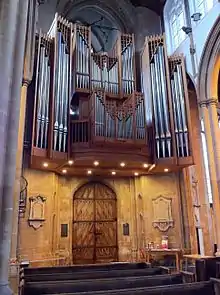St Peter Mancroft
St Peter Mancroft is a parish church in the Church of England, in the centre of Norwich, Norfolk. After the two cathedrals, it is the largest church in Norwich. It was originally established by the then Earl of East Anglia, Ralph de Gael between 1066 and 1075.[1] It was later rebuilt, between 1430 and 1455.[2] It stands on a slightly elevated position, next to the market place.[3]
| St Peter Mancroft, Norwich | |
|---|---|
 St Peter Mancroft. | |
 St Peter Mancroft, Norwich | |
| 52°37′40″N 1°17′33″E | |
| Country | United Kingdom |
| Denomination | Church of England |
| Churchmanship | Central |
| Website | www.stpetermancroft.org.uk |
| History | |
| Dedication | Saint Peter |
| Administration | |
| Province | Canterbury |
| Diocese | Norwich |
| Parish | Norwich, St Peter Mancroft |
| Clergy | |
| Vicar(s) | The Rev'd Edward Carter |
| Assistant priest(s) | The Rev'd Dr Fiona Haworth |
| Curate(s) | Naomi Tuma |
| Laity | |
| Organist/Director of music | Jody James |
| Organist(s) | Julian Haggett |
St Peter Mancroft is a member of the Greater Churches Group.
Description
The present building was begun in 1430, on the site of an existing church, and consecrated in 1455. It is an ambitious building, 180 feet long and ashlar faced with a tower at the west end.[3] It is a Grade I listed building.[4]
It has a Norman foundation dating from 1075, a 1463 font, a 1573 Flemish tapestry and medieval glass. The North transept displays a remarkable collection of church silver (one of the finest of any parish church in the country) including the Gleane and Thistle cups, as well as memorabilia associated with its most famous parishioner, the physician-philosopher Thomas Browne, author of Religio Medici (1642).[5] The small lead-covered spire with flying buttresses was added by A.E. Street in 1896.[3]
In 1850 two L-shaped trenches accommodating a number of acoustic jars were discovered beneath the wooden floor on which the choir stalls had previously stood. The earthenware jars were built into its walls at intervals of about three feet, with the mouths facing into the trenches.[6]
Bells
St Peter Mancroft has a ring of fourteen Whitechapel bells in the western tower, eleven of which date from 1775 and the latest of which dates from 1997. St Peter Mancroft is important in the history of change ringing because in 1715, 5040 changes of Plain Bob Triples were rung for the first time, in 3 hours and 17 minutes, as recorded in an inscription in the tower. Subsequently, the first complete peals to the change ringing systems known as Grandsire and Stedman were also rung in St Peter Mancroft.
Supernatural folklore is linked to the bells in St Peter Mancroft. In the story "Our Bells" authored by Mark Knights, which featured in the undated booklet (circa 1894) "Norfolk Stories", Knight writes:
This story was suggested by a visit to the steeple of St Peter Mancroft many years ago - when Mr P. Back was churchwarden - on the invitation of the late Mr Potter, father of Mr Potter, the present sexton.
The story tells of how a nobleman, fallen upon hard times, unwittingly tries to rob his own brother, but stays his hand after hearing the moving and beautiful Christmas Eve peal of bells. He subsequently assists in the ringing of the New Year's Eve peal, and bequeaths a sum of money to ensure that a jug of spiced ale is made available to future bell-ringers on that date. The story is recounted by a ghostly descendant of the sexton who was in residence when these events occurred.
In 2018 the Mancroft Ringing Discovery Centre was opened, to promote the history of the bell-tower and to train a new generation of bell-ringers.
Incumbents

- Hugh Casselton 1572 - 1588[7]
- William Wells 1598 - 1620[8]
- Thomas Tenison 1670 - 1680
- John Connould 1683 - 1708[7]
- John Jeffrery 1714 - 1723[7]
- Charles John Chapman 1805 - 1826
- John Watson Bowman 1826[9] - 1848[10]
- Charles Turner 1848[11] - 1878[12]
- Sidney Pelham 1879 - 1881
- Henry Neville 1881 - 1884
- Frederick Baggalley 1884 - 1890[13]
- William Pelham-Burn 1890 - 1901
- Frederick James Meyrick 1901[14] - 1929
- Hugh McMullan 1929 - 1940[15]
- Vacant 1940 - 1945[16]
- John Waddington 1945 - 1958
- Kenneth Wilkinson Riddle 1959 - 1960[17]
- Frank Sydney Jarvis 1960 - 1965[18]
- William John Westwood 1965 - 1975
- David Sharp 1975 - 1998
- Peter W Nokes 1999 - 2015
- Robert Avery 2015 - 2017
- Ian Bentley 2017 - 2018
- Edward Carter 2018 – present
Choir
There was once a large male voice choir which disbanded in 2000, though music is still an essential part of worship with the majority of the services being sung by one of the choirs at the Church. The baroque style organ, one of the finest of its kind, means that St Peter Mancroft is also an exceptional concert venue with many concerts being held all the year round.
Organ

A new organ by Peter Collins was installed in 1984. The specification can be found on the National Pipe Organ Register.[19]
Organists
- William Pleasants 1708[20] - 1717 (son of Thomas Pleasants, organist of Norwich Cathedral)
- Humphrey Cotton 1717 - 1720 (afterwards organist of Norwich Cathedral)
- George Baker 1720 - ????
- Samuel Cook ???? - 1780[21]
- Edward Beckwith 1780 - 1793 (acting organist from 1769)
- John Christmas Beckwith 1794 - 1808 (afterwards organist of Norwich Cathedral)
- John Charles Beckwith 1809 - 1819 (son of the above)
- Alfred Pettet 1819 - 1837
- Samuel Critchfield, Junior 1837[22] - 1851
- James Harcourt 1851 - 1877 (afterwards organist of Wymondham Abbey 1880 - 1881)
- Edward Bunnett 1877 - 1908
- Richard John Maddern-Williams, F.R.C.O 1908 - 1922 (formerly assistant at Wells Cathedral)
- Frank Edward Newman 1922 - 1926
- Richard John Maddern-Williams, F.R.C.O 1926 - 1941
- Charles Joseph Romaine Coleman 1942[23] - 1959 (and jointly assistant organist at Norwich Cathedral)
- Kenneth Ryder[24] 1963 - 2005
- Matthew Pitts 2006 - 2009
- Julian Haggett 2009–present
Assistant organists
- Charles Robert Palmer 1899 - 1901[23]
- W. Percy Jones 1910 - ca. 1921 - ????
- Andrew Benians
- Roger Rayner
- Tim Patient 1990 - 2005
References
- "The foundation".
- "St Peter Mancroft: 360° panorama". BBC. Retrieved 24 July 2007.
- Wilson, Bill; Nikolaus, Pevsner (2007). Norfolk 1: Norwich and North- East. Buildings of England (second ed.). Yale University Press. pp. 247–50. ISBN 978-0-300-09607-1.
- Historic England. "CHURCH OF ST PETER MANCROFT (1210490)". National Heritage List for England. Retrieved 3 November 2016.
- "The Historic Churches of Norwich". Norwich Historic Churches Trust. Archived from the original on 5 July 2007. Retrieved 24 July 2007.
- Phipson, Makilwane (1863). "Acoustic Pottery". The Builder: 893.
- "Venn's Alumni of Cambridge: Mancroft". Retrieved 29 December 2020.
- The New York genealogical and biographical record. New York Genealogical and Biographical Society. 1897
- The Clergy list for 1841
- "Venn's Alumni of Cambridge: John Bowman". Retrieved 29 December 2020.
- The Clergy list ... containing complete lists of the clergy in England. 1866
- "Venn's Alumni of Cambridge: Charles Turner". Retrieved 29 December 2020.
- Biographical History of Gonville and Caius College 1349-1897. p.413
- Yorkshire Post and Leeds Intelligencer. 9 November 1901. p.10
- "Church Times: Clergy Appointments, 23 August 1929, p 209". Retrieved 29 December 2020.
- "Church Times: Clergy Appointments, 24 August 1945, p 482". Retrieved 29 December 2020.
- Crockford's Clerical Directory, 1973-74, 85th Edition, p 810.
- "Church Times: Obituary, The Rev Frank Jarvis, 19 March 1965, p 19". Retrieved 29 December 2020.
- National Pipe Organ Register
- Restoration cathedral music, 1660-1714 By Ian Spink
- Norfolk Chronicle, 18 November 1780, p2, column 4
- Norfolk Chronicle, 16 March 1837
- Who's Who in Music. Shaw Publishing Co. Ltd. London. First Post-war Edition. 1949/50
- "Archived copy". Archived from the original on 25 July 2011. Retrieved 6 July 2009.
{{cite web}}: CS1 maint: archived copy as title (link)
External links
- Official website
- Book review article about the medieval stained glass in the church https://web.archive.org/web/20080704061719/http://www.vidimus.org/archive/issue_1_2006/issue_1_2006-04.html